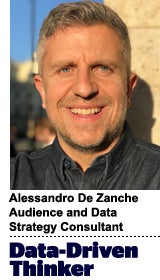“Data-Driven Thinking” is written by members of the media community and contains fresh ideas on the digital revolution in media.
Today’s column is written by Alessandro De Zanche, an audience and data strategy consultant.
Companies’ user data ownership is dead, but we may have not fully realized and accepted it yet.
How will privacy trends evolve over the long term and really affect the advertising and marketing sectors – not to mention citizens at large?
I believe we haven’t seen anything yet. Read California Attorney General Xavier Becerra’s statement on CCPA. The implications could not be any clearer, with phrases like, “Our personal data is what powers today’s data-driven economy and the wealth it generates. It’s time we had control over the use of our personal data – that includes keeping it private.”
GDPR is considered the gold standard that is inspiring most privacy regulations. Its core elements are tightly tied to the rights and freedoms of EU citizens. Human beings are not data points. We are individuals, not IDs.
The theoretical and practical aspect that we must come to terms with is that data ownership, like it or not, is changing hands.
Without it being “leased” from the user, any data collected today by media owners and advertisers has as much value as a pile of leaves in the backyard. If it’s kept without consent, even if not used, the added risk is the equivalent of growing marijuana on the other side of the same backyard.
We can kick, scream and throw tantrums – some will even break the law – or we can use this precious time to make needed changes. Companies should consider personal data in a whole new dimension, and bring it into the core of their customer relationships and the forefront of their strategic priorities.
The rise of user permission
Consent is not an object, a one or zero in a binary choice, but a tangible consequence, a direct result of the user’s knowledge of data and privacy. Hoping that users will click and give consent through ignorance or boredom is very short-term thinking, let alone abysmally unprofessional and unethical.
Consumer views of a media owner’s or advertiser’s trustworthiness will magnify or diminish their quality and widen the gap between those that embrace change and others that will pay dearly for bad practices and time wasted.
User education is becoming a very powerful weapon, the future divider between those trusted to handle personal data and the shady rest. Data-driven competitive advantage will no longer develop along pipes and platforms – it will emerge from a battle for the hearts and minds of consumers. Consent can and should become a barrier to entry into the advertising space, in favor of responsible media owners and advertisers.
As the strategy foundations are shaken to the core and we move from data ownership to data leasing, priority must be focused on education, empowerment and tools that enable an individual’s own data management and control.
This is the golden principle that will make or break the future of our data strategies and business models: Data is not the new oil anymore, user permission is.
Practically, consent and everything it is composed of and triggered by – education, trust, honesty, clarity, values – must be approached with the same importance, care and resources that are dedicated when choosing technology partners.
How companies can educate
A few months ago I spoke about platforms and apps independently helping users to manage their own data and privacy settings, and, ideally, there should be collaboration.
Media owners, especially, should dedicate an educational section or portal on their websites about privacy and personal data, with informative material, tutorials, related news and demos. It shouldn’t be generic but have a personal tone aimed at getting closer to the user, while offering full transparency and disclosure on everything the company is doing with personal data and, crucially, why.
It needs a companywide effort, a team with skills and expertise spanning across marketing, social media, communication, creative, technology, advertising and legal.
Users should be given easy access to privacy preferences through a section of the portal or a widget. The idea that the less we show and the less the user knows, the smarter we are and easier to go on with our business is a primitive approach that will backfire as consumer knowledge grows.
Media owners and advertisers also need consistency of messaging across the company, from how privacy- and data-related content is published and framed to how they deal with these issues with customers on the phone, email or chat.
It should particularly involve advertising teams: Handing user data over to a shady programmatic open marketplace could betray trust and destroy the whole approach, no matter how fantastic of a job has been done until that point. Gaining trust is hard, but losing it can happen surprisingly quickly and easily.
Consumer permissions must be aligned with consumer expectations, and customers must be engaged on their own terms. Understanding those elements is as crucial as profiling and segmenting audiences for insights, personalization and targeting.
If Netflix’s “The Great Hack” documentary about the Cambridge Analytica scandal was an eye-opener for many, they were only Netflix’s paying subscribers, which unfortunately helps society in a very limited way.
What a great occasion for media brands to go back to their roots and bring that knowledge to everybody, build trust and project it onto their business models.
Follow Alessandro De Zanche (@fastbreakdgtl) and AdExchanger (@adexchanger) on Twitter.
















